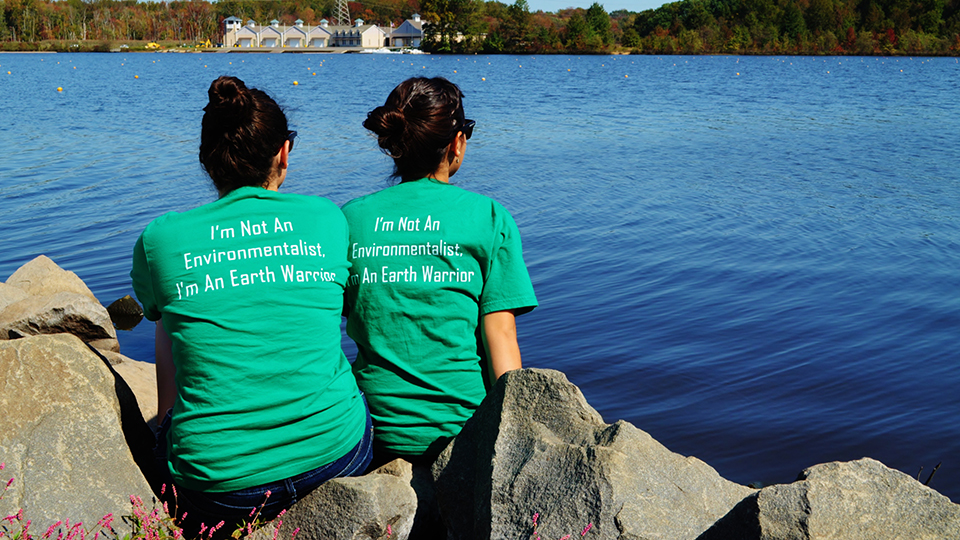by Katelyn White ’14
When I came to Rider, I knew two things for sure. I wanted to be a writer and I wanted to find a job near campus. My college friends convinced me to attend Rider’s Career Fair. Tables were scattered around the Cavalla Room and I came across the “Eco-Representatives” layout. At first, I wasn’t sure what the term even meant, but Melissa Greenberg, sustainability manager, sold me on the valuable job of promoting sustainability on campus, I remembered how I thoroughly enjoyed my environmental science class in high school and signed up.
At the time, I was a vegetarian after watching Food Inc., which revealed the very vivid and disturbing truth about the meat industry. I only knew sustainability for this idea of being “eco-friendly” or “green,” which were all options I started to mold into my lifestyle. Besides this idea of saving the Earth, I had no idea what sustainability entailed. To my surprise, I was hired as an Eco-Rep, which was a title I held for the last four years of my academic career.
The job of promoting sustainability was a lot harder than I thought. Putting it into perspective, a group of seven students with like-minded interests are trying to inform and influence thousands of college students that they should incorporate eco-living into their lifestyles – not exactly that simple. At the end of my freshman year, I knew the basics. I was intrigued by these new terms and issues I had never heard of. The hazardous extraction of natural gas through fracking, the swift melting of glaciers and sea level rise had never crossed my mind before.
For the first time, my eyes and ears were open to something meaningful. The pure impact of climate change and anthropogenic activities made me want to jump out of my seat, scream and share it with the world.
I decided I wanted to have a deeper understanding of the complex system of the environment and how it works. I wanted to take on the challenge to improve environmental reporting to inform the public on what is really happening behind the scenes. I picked up a second major, environmental science, at the end of my freshman year. I also took advantage of the sustainability minor and started taking classes that I knew would give me a greater understanding of the issues and how to address them for positive change.
In my junior year, my advisor, Dr. Daniel Druckenbrod, set up an event for Heidi Cullen from Climate Central in Princeton to speak. Climate Central is a nonprofit organization that researches and reports on climate change and its impact on the American public. Not too long after, an internship opportunity arose and I applied for and got my first internship with Climate Central. After my internship ended, I was offered a job. I had finally started my professional career and have been working there since.
Looking back at my academic career, Rider’s sustainable initiatives went from unknown to Oprah Winfrey-famous. Now, students know who the Eco-Reps are, perhaps in part because of the “Broncs Go Green” T-shirts we wear during events. Don’t get me wrong, the struggle to influence and inform students about how minimal it is to make sustainable initiatives remains. However, the overall transformation in just my short time here has been incredible, and I really believe that my actions over these four years have contributed to this empire of sustainable initiatives that Rider has to offer. From freshman year until now, the Office of Sustainability went from a few small initiatives to many large projects that have impacted all areas of campus.
Sustainability touches every topic, idea or action you can think of: going to the grocery store, sitting at home or eating at a restaurant. We influence our generation to make these choices not for this obscure notion that we want to save the planet, but to ensure that resources and options are available for our future generations.
I know that sometimes it’s difficult to alter your lifestyle. A speaker from our National Campus Sustainability Day event, Entourage actor Adrian Grenier, noted that sustainability is like learning how to walk. We need to have the intent to move forward, picking up our feet and slowly stepping forward, trying to lean back and forth to see if our feet are firmly planted on the ground. Once we have obtained balance, we can take that next step and the next and the next. That is what I plan to do, and I took my first steps toward this lifelong goal here at Rider.

